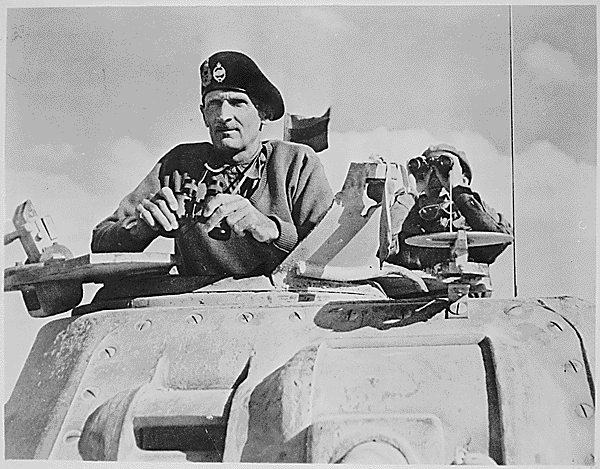British General Bernard Law Montgomery in the North African desert during November 1942
Bernard Law Montgomery ranks among the Second World War's most highly enigmatic and controversial figures. On the one hand, he was the best British operational level commander to fight against Germany during the Second World War. On the other, his deliberate approach to battle, proved the opposite of aggressive leaders such as Manstein, Patton and Zhukov; a fact earning Montgomery much criticism. In particular, Montgomery's leadership in Normandy during 1944 and his cautious pursuit of the retreating Axis armies following their defeat at El Alamein have earned him much criticism.
Montgomery's decisions will always be shrouded in some mystery. Nevertheless when putting his decisions into context there are a number of elements Montgomery must have considered when he planned his various campaigns. First, Montgomery was likely well aware his country lacked the manpower reserves to afford costly mistakes; thus, this knowledge may have played a role in constraining his aggressiveness. In part because of this reason, Montgomery believed in striking only when his army was ready, in a tightly controlled manner that eschewed the aggressive free -wheeling maneuvers that characterized many of his contemporaries' approach to offensive warfare. For example, Montgomery's approach to defeating Rommel at El Alamein, using massive firepower and attacking in a controlled manner designed to wear down his opponent, would come to represent the quintessential British approach to conducting offensives during the remainder of the European War. Indeed, the one time Montgomery would deviate from a highly conventional approach, and launch a mini blitzkrieg of his own in the Netherlands during September of 1944, his offensive would be soundly defeated.
In terms of his personal characteristics, there is less mystery in regards to explaining Montgomery. Although a high-ranking officer during the Second World War Montgomery was no stranger to personal danger, he was a veteran from the First World War, where he had suffered severe wounds. Montgomery was also incredibly disciplined and he eschewed smoking or drinking. Montgomery spent considerable time with his men. He worked at maintaining morale by seeking to lead through garnering a friendly, personal relationship with his men. Montgomery's relaxed approach to his men however did not mean he lacked drive, in fact just as did many of his peers Montgomery possessed a ruthless drive to succeed. In part the animosity directed toward Montgomery following the War in part stemmed from probably the worst aspect of his personality; his monstrous ego. Although hardly unique, Rommel, Guderian and Patton were also notoriously fond of themselves, Montgomery exuded confidence to the point of obnoxiousness. Montgomery actively sought out the media and public attention. Moreover, he frequently told anyone that would listen that only he knew how best to defeat Germany.
In explaining Montgomery's operational level command decisions during the War his previous combat experiences likely played an important role. Having fought as an infantryman in World War One, Montgomery bolstered his experience when he fought in the newly won British colonies in the Middle East, specifically in Palestine, where mechanized warfare represented a novelty during the interwar years. Consequently, his success in defeating Rommel at Alamein, in a set piece battle, reinforced his underlying training and experience. Montgomery lacked the visionary boldness of a Manstein yet he was far from a mediocre commander. In assessing Montgomery's generalship during the War one battle more than any other is crucial - El Alamein.
When Montgomery faced down Rommel at El Alamein there is no question he did so from a position of overwhelming strength and with crucial advantages provided by intelligence gleaned from ULTRA intercepts. Nonetheless, other British generals had held commanding advantages in manpower, equipment and firepower over Rommel in the North African desert and had repeatedly failed where Montgomery succeeded. Defeat therefore had proved an outcome few British Generals inflicted upon Rommel, moreover none produced a defeat the magnitude Rommel suffered at El Alamein - perhaps Montgomery's greatest achievement in the War and one the likes of which was matched by few others.
Picture Courtesy US National Archives, local identifier no. 208-PU-138LL-3


